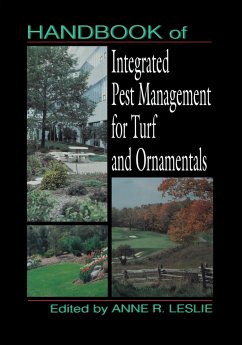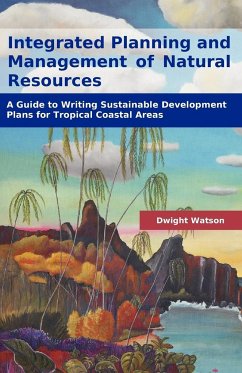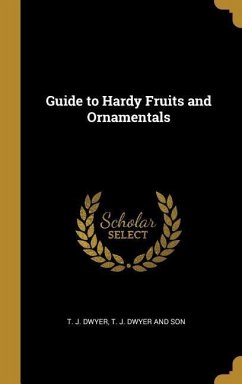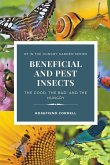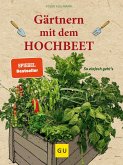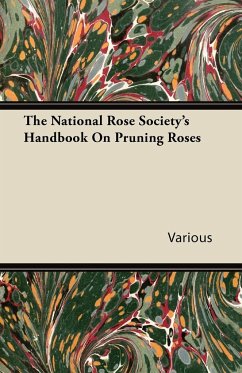Anne R. Leslie, R. Leslie Ed., R. Ed Leslie
Handbook of Integrated Pest Management for Turf and Ornamentals
Anne R. Leslie, R. Leslie Ed., R. Ed Leslie
Handbook of Integrated Pest Management for Turf and Ornamentals
- Gebundenes Buch
- Merkliste
- Auf die Merkliste
- Bewerten Bewerten
- Teilen
- Produkt teilen
- Produkterinnerung
- Produkterinnerung
This essential reference provides complete coverage of integrated pest management (IPM). With more than 40 recognized experts, the book thoroughly details the rationale and benefits of employing an IPM plan and provides technical information on each aspect from cultural practices to choosing when and how to use chemicals. It also brings together research work on pest problems with information on the practical implementation of the tools. Case studies of successful operations are provided as well.
Andere Kunden interessierten sich auch für
![Integrated Planning and Management of Natural Resources Integrated Planning and Management of Natural Resources]() Dwight WatsonIntegrated Planning and Management of Natural Resources29,99 €
Dwight WatsonIntegrated Planning and Management of Natural Resources29,99 €![Guide to Hardy Fruits and Ornamentals Guide to Hardy Fruits and Ornamentals]() T J DwyerGuide to Hardy Fruits and Ornamentals32,99 €
T J DwyerGuide to Hardy Fruits and Ornamentals32,99 €![Beneficial and Pest Insects Beneficial and Pest Insects]() Rosefiend CordellBeneficial and Pest Insects20,99 €
Rosefiend CordellBeneficial and Pest Insects20,99 €![Mushroom Growing for Beginners - With Chapters on Composting, Spawning, Picking and Pest Control Mushroom Growing for Beginners - With Chapters on Composting, Spawning, Picking and Pest Control]() VariousMushroom Growing for Beginners - With Chapters on Composting, Spawning, Picking and Pest Control33,99 €
VariousMushroom Growing for Beginners - With Chapters on Composting, Spawning, Picking and Pest Control33,99 €![Gärtnern mit dem Hochbeet Gärtnern mit dem Hochbeet]() Folko KullmannGärtnern mit dem Hochbeet17,99 €
Folko KullmannGärtnern mit dem Hochbeet17,99 €![The National Rose Society's Handbook on Pruning Roses The National Rose Society's Handbook on Pruning Roses]() VariousThe National Rose Society's Handbook on Pruning Roses32,99 €
VariousThe National Rose Society's Handbook on Pruning Roses32,99 €![Handbook Of Hardy Herbaceous And Alpine Flowers (1871) Handbook Of Hardy Herbaceous And Alpine Flowers (1871)]() William SutherlandHandbook Of Hardy Herbaceous And Alpine Flowers (1871)38,99 €
William SutherlandHandbook Of Hardy Herbaceous And Alpine Flowers (1871)38,99 €-
-
-
This essential reference provides complete coverage of integrated pest management (IPM). With more than 40 recognized experts, the book thoroughly details the rationale and benefits of employing an IPM plan and provides technical information on each aspect from cultural practices to choosing when and how to use chemicals. It also brings together research work on pest problems with information on the practical implementation of the tools. Case studies of successful operations are provided as well.
Hinweis: Dieser Artikel kann nur an eine deutsche Lieferadresse ausgeliefert werden.
Hinweis: Dieser Artikel kann nur an eine deutsche Lieferadresse ausgeliefert werden.
Produktdetails
- Produktdetails
- Verlag: CRC Press / Routledge
- Seitenzahl: 676
- Erscheinungstermin: 1. Juni 1994
- Englisch
- Abmessung: 260mm x 183mm x 40mm
- Gewicht: 1446g
- ISBN-13: 9780873713504
- ISBN-10: 0873713508
- Artikelnr.: 21380539
- Herstellerkennzeichnung
- Libri GmbH
- Europaallee 1
- 36244 Bad Hersfeld
- gpsr@libri.de
- Verlag: CRC Press / Routledge
- Seitenzahl: 676
- Erscheinungstermin: 1. Juni 1994
- Englisch
- Abmessung: 260mm x 183mm x 40mm
- Gewicht: 1446g
- ISBN-13: 9780873713504
- ISBN-10: 0873713508
- Artikelnr.: 21380539
- Herstellerkennzeichnung
- Libri GmbH
- Europaallee 1
- 36244 Bad Hersfeld
- gpsr@libri.de
Anne R. Leslie is a chemist in the Office of Pesticide Programs of the U.S. Environmental Protection Agency (EPA). She has been collecting and disseminating information on Integrated Pest Management (1PM), both urban and agricultural, since joining the 1PM unit of EPA in 1985. Anne completed her undergraduate degree in chemistry at the University of Arizona and did graduate studies at the University of Utah toward a Ph.D. degree in biochemistry. She received a Master of Science degree in Biochemistry at McGill University in Montreal. She joined the EPA in 1980, working on the guidelines for pesticide registration, and later on assessment of exposure to pesticides. Her work in the 1PM unit includes editorship of' several books and chapters on 1PM, presentations to trade groups and professional societies, participation in the USGA Green Section Research Committee, management of 1PM technology transfer grants, and development of EPA brochures on 1PM for Lawns, 1PM in Schools, and 1PM for Homeowners. This year the 1PM functions in EPA are moving to a new one-year pilot division of the Office of Pesticide Programs (OPP), the Biopesticides and Pollution Prevention Division (BPPD). Anne will be one of 33 staff organized in multidisciplinary teams to accelerate the registration and reregistration of biological pesticides, encourage the development and use of safer pesticides, and promote reduce pesticide use. She will be continuing to develop educational materials to inform registrants and the public about pesticide pollution prevention and 1PM.
Dynamics of the Urban Landscape: Toward Sustainable Lawn Turf. The Special
Needs of Landscape Trees. Fate of Pesticides in the Turfgrass Environment.
Sewage Sludge Compost for Establishment and Maintenance of Turfgrass.
Integrated Resource Management. Effects of Pesticides on Beneficial
Invertebrates and Implications for Thatch Accumulation and Pest Outbreaks
in Turf. Preparation for a Healthy Landscape: Determining the Health of the
Soil. Physical Problems of Fine-Textured Soils. Physical Problems of
Coarse-Textured Soils. Understanding Turfgrass Growth Regulation. Choosing
the Right Grass to Fit the Environment. Integrating Cultural and Pest
Management Practices for Sod Production. Advances in Implementing
Integrated Pest Management for Woody Plants. Integrated Pest Management of
Wildflower-Grass Mixer in the Eastern United States. Calibrating Turf Grass
Chemical Application Equipment. Simple Hand Sprayer Calibration. Special
Considerations for Golf Courses: Site Selection and Preparation: A Critical
Task: Siting and Design Considerations to Enhance the Environmental
Benefits of Golf Courses. Design and Management of Constructed Ponds:
Minimizing Environmental Hazards. Minimizing Environmental Impact by Golf
Course Development: A Method and Some Case Studies. Pest Management
Strategies for Golf Courses. Blemishes on the Perfect Landscape: What Can
Go Wrong and Why: Survival of Trees in Metropolitan Areas. Integrated Pest
Management: A Seattle Street Tree Case Study. Major Insect Pests of Turf in
the U.S. Major Insect Pests of Ornamental Trees and Shrubs. Symptomology
and Management of Common Turfgrass Diseases in the Transition Zone and
Northern Regions. Integrated Management of Weeds: Evaluation, Modification
of Management, Control Decisions: Understanding Turfgrass Growth
Regulation. Turfgrass Weed Management-An IPM Approach. Plan Before You
Plant: A Five-Step Process for Developing a Landscape Weed Management Plan.
Weed Management Guide for Herbaceous Ornamenta
Needs of Landscape Trees. Fate of Pesticides in the Turfgrass Environment.
Sewage Sludge Compost for Establishment and Maintenance of Turfgrass.
Integrated Resource Management. Effects of Pesticides on Beneficial
Invertebrates and Implications for Thatch Accumulation and Pest Outbreaks
in Turf. Preparation for a Healthy Landscape: Determining the Health of the
Soil. Physical Problems of Fine-Textured Soils. Physical Problems of
Coarse-Textured Soils. Understanding Turfgrass Growth Regulation. Choosing
the Right Grass to Fit the Environment. Integrating Cultural and Pest
Management Practices for Sod Production. Advances in Implementing
Integrated Pest Management for Woody Plants. Integrated Pest Management of
Wildflower-Grass Mixer in the Eastern United States. Calibrating Turf Grass
Chemical Application Equipment. Simple Hand Sprayer Calibration. Special
Considerations for Golf Courses: Site Selection and Preparation: A Critical
Task: Siting and Design Considerations to Enhance the Environmental
Benefits of Golf Courses. Design and Management of Constructed Ponds:
Minimizing Environmental Hazards. Minimizing Environmental Impact by Golf
Course Development: A Method and Some Case Studies. Pest Management
Strategies for Golf Courses. Blemishes on the Perfect Landscape: What Can
Go Wrong and Why: Survival of Trees in Metropolitan Areas. Integrated Pest
Management: A Seattle Street Tree Case Study. Major Insect Pests of Turf in
the U.S. Major Insect Pests of Ornamental Trees and Shrubs. Symptomology
and Management of Common Turfgrass Diseases in the Transition Zone and
Northern Regions. Integrated Management of Weeds: Evaluation, Modification
of Management, Control Decisions: Understanding Turfgrass Growth
Regulation. Turfgrass Weed Management-An IPM Approach. Plan Before You
Plant: A Five-Step Process for Developing a Landscape Weed Management Plan.
Weed Management Guide for Herbaceous Ornamenta
Dynamics of the Urban Landscape: Toward Sustainable Lawn Turf. The Special
Needs of Landscape Trees. Fate of Pesticides in the Turfgrass Environment.
Sewage Sludge Compost for Establishment and Maintenance of Turfgrass.
Integrated Resource Management. Effects of Pesticides on Beneficial
Invertebrates and Implications for Thatch Accumulation and Pest Outbreaks
in Turf. Preparation for a Healthy Landscape: Determining the Health of the
Soil. Physical Problems of Fine-Textured Soils. Physical Problems of
Coarse-Textured Soils. Understanding Turfgrass Growth Regulation. Choosing
the Right Grass to Fit the Environment. Integrating Cultural and Pest
Management Practices for Sod Production. Advances in Implementing
Integrated Pest Management for Woody Plants. Integrated Pest Management of
Wildflower-Grass Mixer in the Eastern United States. Calibrating Turf Grass
Chemical Application Equipment. Simple Hand Sprayer Calibration. Special
Considerations for Golf Courses: Site Selection and Preparation: A Critical
Task: Siting and Design Considerations to Enhance the Environmental
Benefits of Golf Courses. Design and Management of Constructed Ponds:
Minimizing Environmental Hazards. Minimizing Environmental Impact by Golf
Course Development: A Method and Some Case Studies. Pest Management
Strategies for Golf Courses. Blemishes on the Perfect Landscape: What Can
Go Wrong and Why: Survival of Trees in Metropolitan Areas. Integrated Pest
Management: A Seattle Street Tree Case Study. Major Insect Pests of Turf in
the U.S. Major Insect Pests of Ornamental Trees and Shrubs. Symptomology
and Management of Common Turfgrass Diseases in the Transition Zone and
Northern Regions. Integrated Management of Weeds: Evaluation, Modification
of Management, Control Decisions: Understanding Turfgrass Growth
Regulation. Turfgrass Weed Management-An IPM Approach. Plan Before You
Plant: A Five-Step Process for Developing a Landscape Weed Management Plan.
Weed Management Guide for Herbaceous Ornamenta
Needs of Landscape Trees. Fate of Pesticides in the Turfgrass Environment.
Sewage Sludge Compost for Establishment and Maintenance of Turfgrass.
Integrated Resource Management. Effects of Pesticides on Beneficial
Invertebrates and Implications for Thatch Accumulation and Pest Outbreaks
in Turf. Preparation for a Healthy Landscape: Determining the Health of the
Soil. Physical Problems of Fine-Textured Soils. Physical Problems of
Coarse-Textured Soils. Understanding Turfgrass Growth Regulation. Choosing
the Right Grass to Fit the Environment. Integrating Cultural and Pest
Management Practices for Sod Production. Advances in Implementing
Integrated Pest Management for Woody Plants. Integrated Pest Management of
Wildflower-Grass Mixer in the Eastern United States. Calibrating Turf Grass
Chemical Application Equipment. Simple Hand Sprayer Calibration. Special
Considerations for Golf Courses: Site Selection and Preparation: A Critical
Task: Siting and Design Considerations to Enhance the Environmental
Benefits of Golf Courses. Design and Management of Constructed Ponds:
Minimizing Environmental Hazards. Minimizing Environmental Impact by Golf
Course Development: A Method and Some Case Studies. Pest Management
Strategies for Golf Courses. Blemishes on the Perfect Landscape: What Can
Go Wrong and Why: Survival of Trees in Metropolitan Areas. Integrated Pest
Management: A Seattle Street Tree Case Study. Major Insect Pests of Turf in
the U.S. Major Insect Pests of Ornamental Trees and Shrubs. Symptomology
and Management of Common Turfgrass Diseases in the Transition Zone and
Northern Regions. Integrated Management of Weeds: Evaluation, Modification
of Management, Control Decisions: Understanding Turfgrass Growth
Regulation. Turfgrass Weed Management-An IPM Approach. Plan Before You
Plant: A Five-Step Process for Developing a Landscape Weed Management Plan.
Weed Management Guide for Herbaceous Ornamenta

